- Home
- MaryJanice Davidson
Deja New Page 15
Deja New Read online
Page 15
“So you left to get out of the spotlight, but took a job that put you right back in it, and kept you in it.”
She shrugged. “There wasn’t a conscious plan, that’s just how it worked out. And urgh!” She stretched and rubbed the small of her back with both hands. “Come on. Unlike you I’m a pregnant crone and this floor is hard.”
“You’re not a crone and you’re not even showing.”
“Irrelevant! Help me up and we’ll sit at the turtle table and you can ask me anything you want while I drink juice and don’t stir mustard into it.”
“Anything? Really?” Then: “‘Mustard’?”
“Less asking, more pulling.”
When they were at the table and Leah was sipping her mustard-free juice: “Yes. Anything. But I warn you, any sex-related questions will be awkward and we’ll probably have to avoid eye contact for a few days.”
“Just . . . gross. No.” He leaned forward. “Did you ever like it?”
I’m going to assume he’s talking about Insighting. “Sometimes,” she admitted. “I’ve been able to help a lot of clients.” She thought of Chart #6291, formerly Clara Barton, currently chief of neurosurgery at Massachusetts General. And Chart #5272, formerly Ludwig van Beethoven, currently the author of Musical Anhedonia Hath No Charms (“How can I be him? I hate classical music. And concerts. And my hearing’s fine.”). The actions and consequences from their past lives bled into their present ones, paralyzing them. Leah had helped with that.
It wasn’t always about making a mark, she’d explained to a construction worker who used to be Albert Einstein—the month before she met Archer. “You don’t have to live up to your last life. You love being an electrician. That’s great. Do you know how many people I meet who hate their jobs? Do you know how many people anyone meets who hate their jobs? To be honest, I’m a little envious. You make good money, you and your husband are raising a beautiful family, you love your life, what’s the problem?”
“Well, after my folks had me tested . . .”
“Can I tell you something? Pretexting often brings more problems than it solves. It’s like an IQ test: It narrows everyone’s expectations. ‘You have a genius IQ so you’d better invent something wonderful. Or cure something terrible. Make your mark or you’ve wasted your life. No pressure.’ Expecting children to live up to that is begging for trouble.
“Pretexting does the same thing: ‘You used to be Alexander Graham Bell, so we’re already talking to MIT since you’ll have an incredible life and become world famous by your thirtieth birthday.’ It’s crap. It’s a straitjacket.”
Other patients had the reverse problem, and she had helped them understand they didn’t have to live down their past lives, either. “So you were a necrophiliac who targeted landladies until you were hanged in 1928?* You’re not compelled to kill, you don’t have to write letters of condolence to the victims’ great-great-grandchildren. And if you’re that worried your past will bleed into your present, buy. Don’t rent.”
Well, that one was perhaps oversimplified. But never mind. The bottom line is . . .
“Sometimes the work is beyond rewarding. Since most people only ever hear me complaining, it’s only fair to mention that there are many days when I like what I do. It goes beyond helping people in their day-to-day lives. I’ve been able to work with the police and attorneys to put away some utter degenerates. There’s satisfaction in that.”
Jack was nodding. “Okay. Sure.”
“It’s a little like being a world-famous baker who doesn’t like cake. Possessing the skill doesn’t mean you love it. People demanding your cake doesn’t mean you actually like baking.” Not my best metaphor. Well, it is past midnight.
“But you’re different from me. Just like Angela’s different from me. What works for you might not help me.”
“I’m not sure I follow.”
“Because you’re—I dunno—the Bette Davis of Insighters. Or something.”
She groaned. “Oh, my God, you’ve all got to stop that. Not least because you’ve got it wrong. Davis had natural talent that she built on. She was relentless and fearless about her craft—she liked playing monsters—and the work was always, always her number one focus. It’s why she was so mesmerizing on-screen. If you go back and watch the early films, you can almost see how each picture is a stepping-stone to the deeper characterization she found for the next.”
“Oh, my God.”
“I know.”
“Film geek.”
“Yes, well, Hollywood childhood. Those movies were my homework. And the best part—” She laughed a little, remembering. “My mom was furious when I told her she’d never been famous except for that time she’d been a serial killer—”*
“Wait, what?”
“—and she certainly wasn’t the reincarnation of Davis. Or Garland. Or Hepburn. Or anyone of note.”
“Can we circle back to your mom the serial kil—”
“The thing is, Jack, if I was the anything of Insighters, I’d be Greta Garbo: skilled, but ultimately resentful of the attention it brought and constantly tempted to exile myself.”
“Um . . .”
“Sometimes I can barely be bothered to try. Which makes me the jerkass of Insighters.”
“You’re not making me feel better about being a freak.”
“Ah, but as I remind my clients, my job isn’t to make them feel better. It’s to help them see. What I’m trying to explain is, it doesn’t have to define you. It doesn’t have to be a career. You don’t have to end up—” Like me. “For most people, like your sister, it’s just something they have a knack for. Like being great with numbers—the fourteen-year-old kid taking college trig, for example. Or like knowing what spices go together with what food even if you’ve never cooked. It helps—or hinders—exactly as much as you want it to. What if that same math whiz decides on medical school? It doesn’t mean they’re not a math genius, they’re just putting their focus elsewhere.”
She cleared her throat. “Wow, I’m talking a lot.”
“Uh-huh. But, Leah, the thing is—” In his anxiety, Jack grabbed Leah’s hand, squeezing for emphasis. “That’s why Angela’s always been so obsessed with Dad’s case.”
Unspoken: And I don’t want to be like that.
“Is that what you think? That it’s about her gift, and not her personality?” Is that what you all think? That explains quite a bit, come to think of it. She shook her head. “No, Jack. Your sister’s obsessed—and I don’t think she’s clinically obsessed, by the way. We throw that word around far too often, so many people use ‘obsessed’ when what they really mean is ‘focused’ or—”
“Argh.”
“Sorry. Your father’s murder is a constant, strong issue for her because that’s her nature, and it’s nothing to do with Insight. Her attention to detail, her reliance on being in control—”
She was delighted when he snickered; it was an improvement over tearful despair. “Soooo tactful.”
“Yes, well, I’ve got skills. Angela’s personality traits have little to do with the ability. The way she looks after all of you—do you think that’s because she knows Jordan died of gangrene after biting his tongue?”*
“What?”
“No, it’s because something in her compels her to take care of all of you. Your sister isn’t driven to spend years researching a murder because she can see other lives. She’s driven to research it because she knows something’s wrong and she wants to fix it.”
“Okay. That’s—okay.” He sighed. “Can we stop talking about this for now? I’m not trying to be mean. It’s just, there’s a lot to think about.”
“Of course.”
“I don’t feel . . . better, exactly? Just less bad, and I don’t think that’s the same thing. But I’ll take it. To be honest, I’m so tired I feel like you wrapped a brick in cotton an
d whacked me in the forehead with it.”
“That’s what I’m here for.”
He started to get up from the table, then paused. “Don’t tell anybody, okay?”
“Of course.”
“And thanks. For talking to me.”
“Of course.”
“You want some more juice?”
“No, I thought I’d go back to bed and try to sleep.”
“Me, too.” He headed for the doorway, then paused and turned. “Y’know, you’re really screwed up,” he said cheerfully. “Your family’s worse than mine, which I sort of thought was impossible. But think about it!”
“I have.”
“Your mom killed you a lot—”
“I remember.”
“—and was a serial killer—”
“Yes, I’m aware.”
“—and you’re pregnant with a Drake baby—”
“For Christ’s sake. I get it.”
“—and you have to go back to prison again.”
“All true. Not sure what your point is.”
“There’s just so much madness wrapped up in all that. It’s kind of glorious, you know?”
That made her laugh. Hard. And why not? The kid had a point. He’d also reminded her that helping clients see themselves gave her perspective into her own brand of insanity. She still didn’t know what to do about The Return of Nellie Nazir, but it was a problem she didn’t have to solve on her own, and remembering that was always valuable.
THIRTY-THREE
A lighthearted fact about chronic depression: One of the first things to bid you adieu is your sex drive. When you don’t have the energy or drive to get out of bed, the last thing you want is someone in the bed with you, especially when they’re advocating a vigorous skin-to-skin workout.
I am in a cemetery (aboveground, fortunately) pondering my sex drive. This is probably one of those thoughts to keep to myself.
He finished sorting the items in his trunk and turned when he heard the car roar in past the gates, dart around the parking lot, swing into a spot, and there was Angela, trying to get out of the vehicle before she unbuckled her seat belt. Or turned off the ignition.
How can you help but admire the woman’s drive to vindicate her uncle? She nearly strangled on her seat belt in her rush to get to the truth. Outstanding.
She waved and came over in a hurry, blowing her delightfully tousled bangs off her forehead. “Good morning almost afternoon.”
“Angela.” Ah. She’s here, so it must be time for me to stiffen up and display my lack of interpersonal skills. “Hello.”
“Not that I mind, but why did you want to meet here?” She looked around the beautiful cemetery while simultaneously avoiding the gaze of the Eternal Silence statue. “We’re not due at ICC until four o’clock.”
“I thought—”
She had slowed as she got closer and was only a couple of feet away. “Oh. Hey! Oh.”
He blinked, glanced down. He was in jeans and a short-sleeved dark green button-down. Loafers with socks. Most definitely with socks. “Something wrong?”
“No-no-no. I’ve just always seen you in suits. It’s nice. You’re nice. It looks nice, is what I mean. You do. Look nice.” She smacked herself on the forehead. “Oh, my God, I’ve got to start getting more sleep.”
He laughed. “That seems to be a common theme this month. I suspect the only one getting a full eight hours per is your uncle. And possibly your mother.”
“I promise I don’t always babble this much.” She looked down at herself. “But now I’m wondering. Am I overdressed?”
“Not at all.”
In fact, she was perfectly dressed in crisp black capris with a white blouse and over that, a deep rose sweater with whatever those wide necklines were, the cut that showed off her slender shoulders.* Shiny black loafers completed the look, which was practical and lovely for the mild summer weather.
“You look—” Beautiful. Perfect. Cemetery-friendly? No. “You’re fine.” Oh, for . . .
He pulled his keys out of his pocket and hit the button to open the trunk, then stepped aside so she could see. He’d asked for, and gotten, permission to bring his car through the gates and park on the side road less than thirty feet from Donald Drake’s grave.
She looked. And looked. Five seconds in, his nerves started to jangle. Does she think I’m going to kill and bury her? Which is why we’re in a cemetery? That would be disastrous.
“This is—” She stopped, then started again. “It almost looks like you brought a lot of cleaning supplies and brushes and paint remover and garbage bags and the like. To my dad’s grave. Which was defiled. And which no one’s had a chance to clean up.”
He looked at her. Well. Tried. She was still staring into his trunk. “You said, ‘We’re gonna have to clean this up.’”
Her pale cheeks were flushed. “I didn’t mean you and I should clean it up. I meant the Drakes.”
You overstepped. Again. “Oh.”
She must have seen something in his expression because she reached out at once and seized his hand, then stared up into his face. This was startling and wonderful. She had never touched him outside of a handshake; she had never looked at him so intently. “You set up another visit with my uncle where he’s likely to insult you, and then you arranged to meet me here so we’d have time to clean up my father’s grave so my little brothers and cousins wouldn’t see it.”
“Yes. But I see now that—”
Her small hand clamped down on his, and he swallowed a yelp. Yeow! Stronger than she looks. “This is, no shit, one of the nicest things anyone’s ever done for me.”
Oh, thank God. “It is? Really?” He could hear the delight in his tone and resigned himself to constantly making an ass of himself whenever he was in Angela Drake’s presence. “I mean, that’s nice. That you like my idea. And don’t feel I exceeded boundaries.”
“You’re not exceeding anything, I promise.” She paused. “Uh, I’ll rephrase.”
“And after, if you like, I was thinking we could have a picnic. If you want.” If you don’t think I’m a presumptuous freak with lustful designs on your body. Only one of those things is true.
Her grin was sunshine bright, and almost as warm. “Jason, I would love that. Which is weird. But I don’t give a shit. Also, I swear more when I’m nervous.”
“I make you nervous?” That came out pretty neutral. At least he didn’t say “I make youuuuu nervous????” with an accompanying flabbergasted expression.
“You, cemeteries in general, pending trips to prison . . . y’know, the usual.” She released his hand and he massaged the feeling back into his fingers when she wasn’t looking. She rummaged around in the trunk and brought out brushes, a pair of bright yellow dishwashing gloves, and one of the buckets. “Well, then. Let’s get to it. Also I might use one of those big Hefty bags as a smock.”
She did.
It was adorable.
THIRTY-FOUR
Ninety minutes later and the stone, if not good as new, looked a lot better. The gouges couldn’t be fixed, but you could read Donald’s name. It no longer looked like a nutjob had gone to town on it, just that time was doing some aggressive damage. That was more than Angela thought two people could get done in under two hours. Especially when one of the two was trying not to stare at the other one’s butt in jeans.
That. Ass. It’s not fair, it’s really not.
They cleaned up and packed everything back in Jason’s trunk. He went around to the back seat and pulled out a light green backpack with tan accents; there was a wine bottle strapped to one side and a rolled-up tan blanket on the other. He slung it over one shoulder, smiled at her, and said, “Shall we?”
Damned right. She was famished. Jack had slept late, but when he didn’t make a big family breakfast, she tended not to bother, and if that
occasionally led to her wolfing down a bowl of dry cereal at her desk (or wet cereal over the sink), that was her business. Even if she’d shown up with a full stomach, scrubbing a tombstone for ninety minutes would kindle anyone’s appetite. Probably. Maybe a normal person would lose their appetite after scrubbing the graffiti off their dad’s gravestone. She honestly had no idea; “normal” was beyond any of them.
But now what? Was this a date? Or just a relaxing post–tombstone cleaning ritual between colleagues who weren’t actually colleagues? Maybe he had planned to have an alfresco lunch all along and invited her to be polite. They weren’t holding hands. But it wasn’t uncomfortable, either; they were walking—strolling?—together. Her controlling nature was baffled: It couldn’t qualify what was going on, so she kept getting more and more confused. And the longer they were quiet, the harder it got to say something.
Luckily a small child had been struck by lightning a hundred years ago; it was the perfect icebreaker. She pointed out the statue of poor Inez Clarke, murdered by Mother Nature at age six. Her heartbroken parents had commissioned a statue of her exact likeness and sealed it in a glass box on the grounds. The thing was more than a century old and looked like it had been up less than a year.
“Your standard sad story,” Angela said. “Except.”
Jason smiled. “Always an ‘except.’”
“Except when there isn’t an except. Luckily that’s not the case this time. Except they say that when it’s a stormy night, she leaves.”
“‘Leaves’?” Jason was now standing in front of the glass box encasing the statue, one hand holding the picnic backpack, the other fiddling absently with a belt loop. “What, she takes her show on the road? Runs away? Teleports? Goes on strike?”
“Dunno. At least one guard quit over it. He was doing his walk-around in a rainstorm at midnight—”
“Have you ever noticed these stories never take place in bright sunshine at 10:00 a.m.?

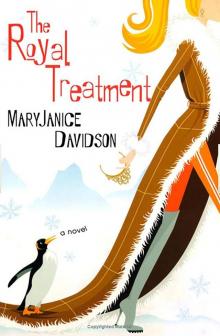 The Royal Treatment
The Royal Treatment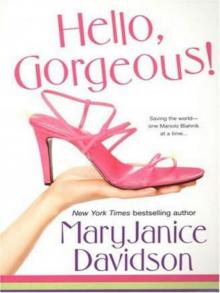 Hello, Gorgeous!
Hello, Gorgeous!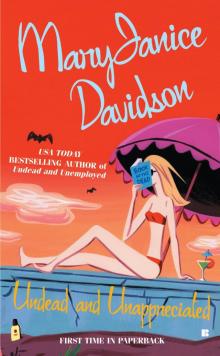 Undead and Unwed
Undead and Unwed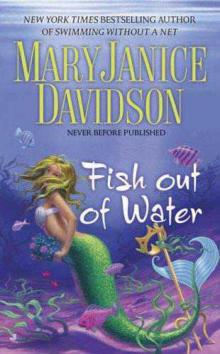 Fish Out of Water
Fish Out of Water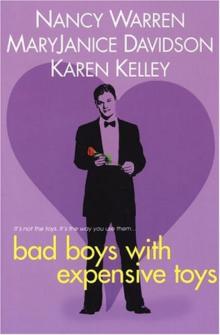 The World Is Too Darned Big
The World Is Too Darned Big Loves Prisoner
Loves Prisoner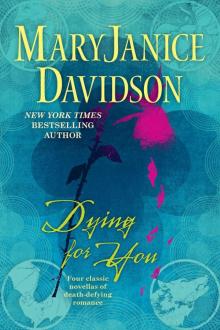 Dying for You
Dying for You Love Lies
Love Lies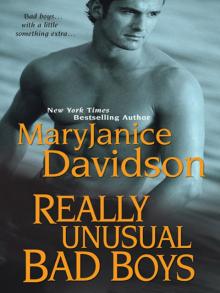 Really Unusual Bad Boys
Really Unusual Bad Boys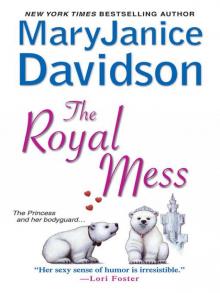 The Royal Mess
The Royal Mess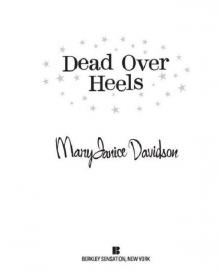 Dead Over Heels
Dead Over Heels Rise of the Poison Moon
Rise of the Poison Moon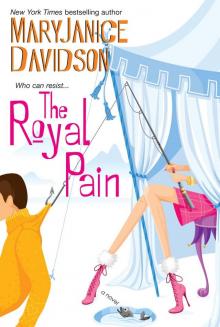 The Royal Pain
The Royal Pain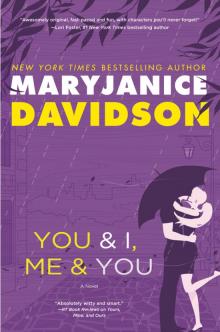 You and I, Me and You
You and I, Me and You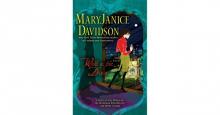 Jareds Wolf
Jareds Wolf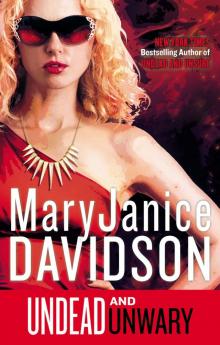 Undead and Unwary
Undead and Unwary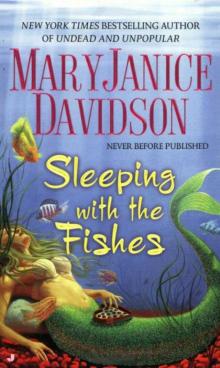 Sleeping With the Fishes
Sleeping With the Fishes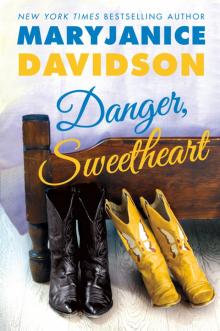 Danger, Sweetheart
Danger, Sweetheart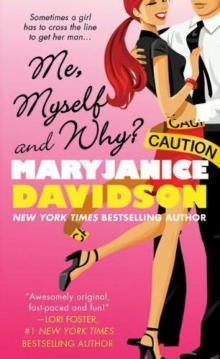 Me, Myself and Why?
Me, Myself and Why?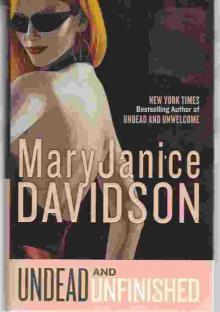 Undead and Unfinished
Undead and Unfinished Deriks Bane
Deriks Bane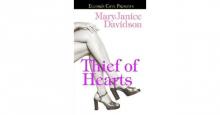 Thief of Hearts
Thief of Hearts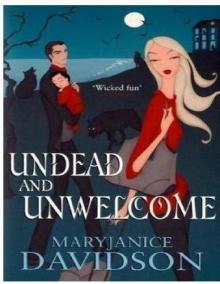 Undead and Unwelcome
Undead and Unwelcome Deja Who
Deja Who Deja New
Deja New Under Cover
Under Cover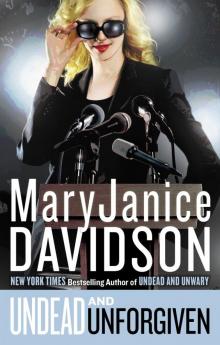 Undead and Unforgiven
Undead and Unforgiven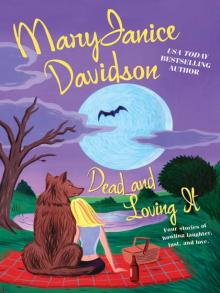 Dead and Loving It
Dead and Loving It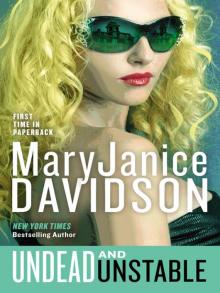 Undead and Unstable
Undead and Unstable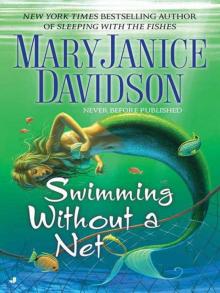 Swimming Without a Net
Swimming Without a Net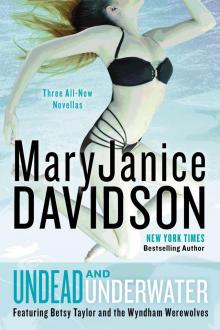 Undead and Underwater
Undead and Underwater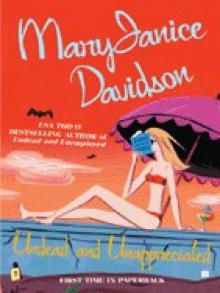 Undead and Unappreciated
Undead and Unappreciated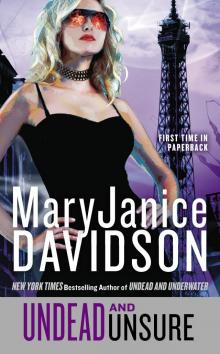 Undead and Unsure
Undead and Unsure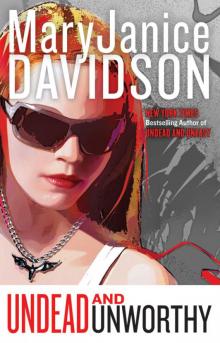 Undead and Unworthy
Undead and Unworthy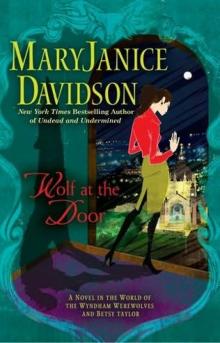 Wolf at the Door
Wolf at the Door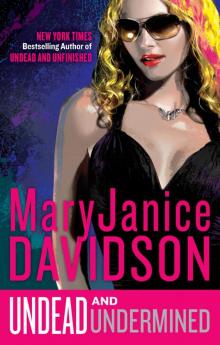 Undead and Undermined
Undead and Undermined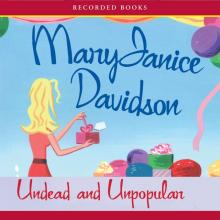 Undead and Unpopular
Undead and Unpopular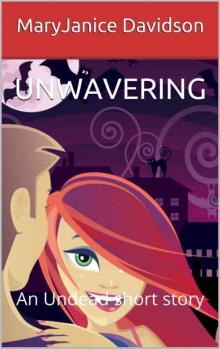 Unwavering
Unwavering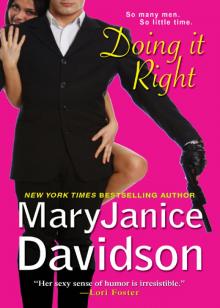 Doing It Right
Doing It Right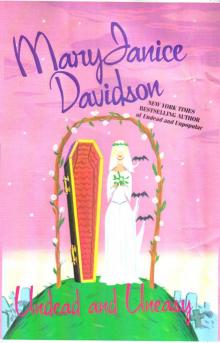 Undead and Uneasy
Undead and Uneasy Drop Dead, Gorgeous!
Drop Dead, Gorgeous!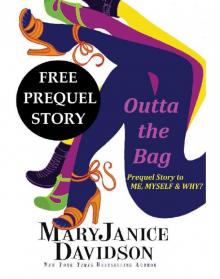 Outta the Bag
Outta the Bag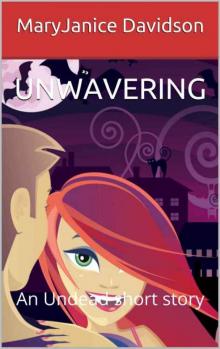 UNWAVERING: An Undead short story (Undead shorts Book 1)
UNWAVERING: An Undead short story (Undead shorts Book 1) Jennifer Scales and the Ancient Furnace
Jennifer Scales and the Ancient Furnace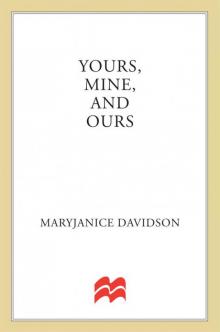 Yours, Mine, and Ours
Yours, Mine, and Ours Under Cover (v1.1)
Under Cover (v1.1)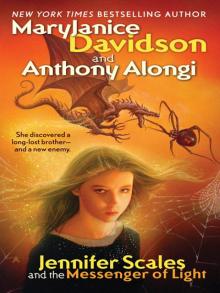 Jennifer Scales and the Messenger of Light
Jennifer Scales and the Messenger of Light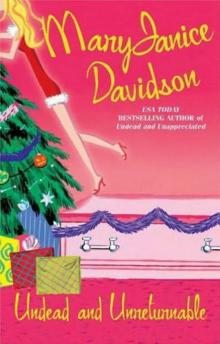 Betsy 4 - Undead and Unreturnable
Betsy 4 - Undead and Unreturnable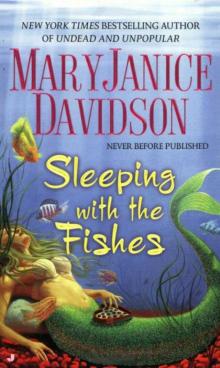 Sleeping with the Fishes (v1.1)
Sleeping with the Fishes (v1.1) betsy short 02 - ureliable
betsy short 02 - ureliable Evangelina
Evangelina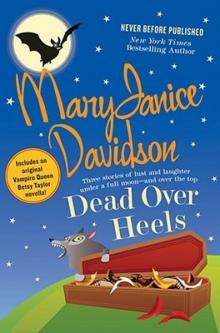 Dead Over Heels (wyndham werewolf)
Dead Over Heels (wyndham werewolf)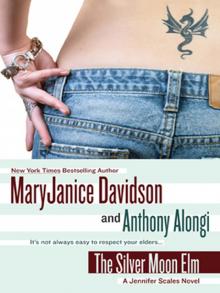 The Silver Moon Elm
The Silver Moon Elm Faeries Gone Wild
Faeries Gone Wild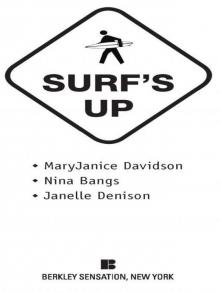 Surf's Up
Surf's Up Seraph of Sorrow
Seraph of Sorrow Demon's Delight
Demon's Delight